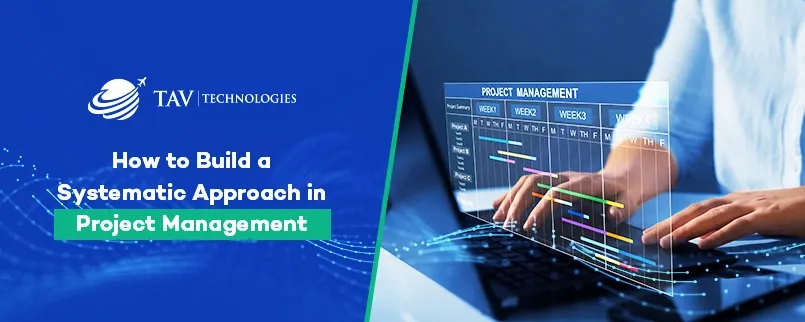
Feb 2023
Project management is a crucial factor in ensuring the success of any project. It involves the process of planning, organizing, and managing resources to achieve specific goals within a specified timeline. Effective project management requires using standardized methodologies and tools to ensure that projects are completed on time, within budget, and by guaranteeing the satisfaction of all related stakeholders. TAV Technologies is a company that specializes in executing complex tasks by applying the Project Management Institute (PMI) methodologies and standards.
Following Project Phases to Reach Success
TAV Technologies reviews and categorizes all airport technology projects based on time, cost, strategic impact, risks, and scope. This categorization helps select the appropriate project managers and resources required for each project. They are appointed based on their experience, know-how, and ability to manage projects efficiently. Project experts follow five fundamental steps to manage a successful project. These are Initiating, Planning, Executing, Monitoring & Controlling, and Closing.
1.Initiating:
In the first phase, the experts define the project's scope, identify stakeholders, and establish the project's overall objectives. The project manager also creates a project charter that outlines the project's purpose, goals, and deliverables.
2.Planning:
During this phase, the experts create a detailed project plan that includes all the necessary tasks, resources, and timelines to complete the project. The project manager identifies potential risks and establishes a risk management plan to address them.
3.Executing:
The third step in project management is executing. During this phase, the project experts implement the project plan, putting all the necessary resources and processes in place to achieve the project goals. This is the most hands-on phase of the project management process, and it requires close collaboration among project team members to ensure that everything is running smoothly.
4.Monitoring & Controlling:
During the fourth phase, the project managers track the project's progress, monitor its performance against the project plan, and make any necessary adjustments to ensure that the project is on track to meet its goals.
5.Closing:
During the final phase, the experts review the project's performance, analyze its successes and failures, and finalize any remaining deliverables or documentation.
Utilizing Various Project Approaches
Project managers have a range of approaches to choose from when managing a project and selecting the necessary approach can make a significant difference in project success. Three popular project management approaches are Predictive, Hybrid, and Agile. Each approach has its unique characteristics, advantages, and disadvantages.
What is the Predictive Approach?
The predictive approach, also known as the Waterfall model, is a sequential project management technic. It is characterized by a linear and rigid project management process that follows a fixed set of steps. The predictive approach assumes that the project requirements and scope are well-defined and stable. Thus, the project can be executed using a predefined timeline and budget. The predictive system is beneficial when dealing with projects with a well-defined scope.
What is the Agile Approach?
The Agile approach is a flexible and iterative project management approach used when the project requirements are not well-defined and the project outcome is uncertain. Agile methodologies such as Scrum, Kanban, and Extreme Programming (XP) are becoming increasingly popular for software development projects. This method breaks down a project into smaller and more manageable iterations called sprints.
What is the Hybrid Approach?
The hybrid approach combines elements of both predictive and agile practices. The hybrid practice is suitable for projects that have a mix of well-defined and evolving requirements. It allows project managers to adjust the project management process to fit the project's unique characteristics. The hybrid approach is flexible while still providing a structured framework.
TAV Technologies also uses different approaches according to specific needs in each project. The predictive approach is suitable for well-defined and stable projects, while the hybrid approach is better for projects with a mix of well-defined and evolving requirements. On the other hand, the Agile approach works well in projects with changing conditions and uncertain outcomes. Ultimately, project managers of TAV Technologies carefully evaluate the project's characteristics and select the most appropriate approach to deliver positive outcomes.
The Role of Communication in Project Management
Project managers must take a proactive role in ensuring effective communication in the projects. TAV Technologies utilizes the RACI matrix for communication between stakeholders, ensuring that each project responsible understands their roles and responsibilities. Standard organizational formats and templates are used for all formal project communications.
As a leading technology provider, TAV Technologies manages and controls numerous projects on four continents. Without a reliable project strategy, it would be impossible to coordinate the vast number of stakeholders and multi-site implementations simultaneously. By categorizing projects, utilizing various methodologies and tools, and focusing on effective communication management, TAV Technologies ensures the successful completion of projects on time and within budget in each region.
